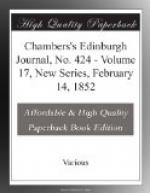About the same time, we are informed that ’the celebrated J.J. Rousseau hath for the present taken up his residence at a friend’s house in Putney.’—The number for October 26, 1765, contains an advertisement of a ‘beggar’s stand’ (copied from the Public Advertiser), ’to be let, in a charitable neighbourhood. Income, about 30s. a week.’
The following reference to our acquaintances, the Sikhs, now sufficiently well known, is curious, as it is doubtless one of their first appearances in the columns of the English press. It is dated July 5, 1766: ’The Seyques, an idolatrous people inhabiting the neighbourhood of Cachemire, whose name was hardly known two years ago, have beaten Abdaly and the Patanes whom he commanded.’ Modern Cockneys would stare to read a paragraph like this: ’A great deal of grass hath been cut down about Islington, Kentish-Town,’ &c.
We will conclude our selections, which have now grown quite desultory and miscellaneous, by the brief obituary of a ‘remarkable’ man, from the Chronicle of July 26, 1766: ’Thursday, died at his house near Hampstead, the Rev. Mr Southcote, remarkable for having a leg of mutton every night for supper during a course of forty years, smoking ten pipes as constantly, and drinking three bottles of port.’
GENIUS FOR EMIGRATION.
Lady E. Stuart Wortley, in the account of her journey in America, mentions that she saw a man proceeding on foot across the Isthmus of Panama, bound for the Pacific, carrying a huge box on his back that would almost have contained a house. It was really a dreadful thing to see the poor man, full-cry for California, toiling along with his enormous burden, under a tropical sun, the heat of which he required to endure through forty miles of wilderness, and no chance of relief or refreshment by the way. Yet this serio-comic spectacle is not singular. Multitudes seem to have gone to the diggings with every species of encumbrance, and in a totally unsuitable garb. Splendid dress-coats and waistcoats, boots and pantaloons, but no working-clothes, nor implements for camping, and in many instances not even a cloak: everything suitable for the enjoyment of their golden promises, with nothing to assist in realising them.
Nearly the same thing has occurred in innumerable instances as regards Australia. The men going thither must in general be shepherds or their masters; and to be either to any purpose, they must go far into the bush. For this they required a talent for constructing huts for themselves and servants, and hurdles for the cattle, and consequently tools to assist them; but they often went without either tools or talents, and so had to pay extravagantly for very common services. They may have had common clothes, but they had made no provision for living far from the assistance of women; and consequently, if a coat-sleeve was torn, it must hang just as it was; if a stocking




